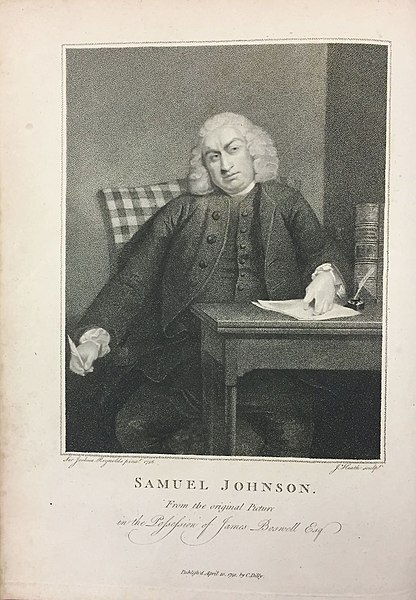
Samuel Johnson And His Dictionary
Samuel Johnson and the Dictionary of the English Language
In 1747, Samuel Johnson – a failed schoolteacher who was making a living as a journalist, alongside writing poetry and drama – embarked on an incredibly ambitious task. He set out to collect all the words in the English language together in a single book, complete with definitions and examples of how they should be used. This enormous feat was to take him almost a decade. Johnson’s Dictionary of the English Language was published in 1755, and became a bestseller which dominated the dictionary market for many years. Although Johnson did not manage to record absolutely every English word in his Dictionary, he included over 40,000 of them. The Dictionary was, ‘for all its eccentricity … a masterpiece and a landmark’, as Robert McCrum comments in The Guardian (The 100 best nonfiction books: No 86 – A Dictionary of the English Language by Samuel Johnson (1755).
Let’s take a closer look at the life and work of Samuel Johnson, a truly extraordinary individual.
• Samuel Johnson was the son of a bookseller. He studied at Oxford, but lack of money caused him to leave after a year. He became a teacher and writer.
• In 1746, a group of London booksellers commissioned Johnson to compile a dictionary of the English language. They hoped that it would stabilise language rules.
• Although Johnson initially sought to fix the English language, he soon came to realise that this would be impossible, as language is constantly changing; he could only strive to produce a record of it, in as much detail as possible.
• In the Preface to the Dictionary, Johnson said:
When I took the first survey of my undertaking, I found our speech copious without order, and energetic without rules: wherever I turned my view, there was perplexity to be disentangled, and confusion to be regulated … Having therefore no assistance but from general grammar, I applied myself to the perusal of our writers; and noting whatever might be of use to ascertain or illustrate any word or phrase, accumulated in time the materials of a dictionary, which, by degrees, I reduced to method.
• The Dictionary contains over 114,000 quotations, from Johnson’s favourite authors such as Milton and Shakespeare, which illustrate how words should be used. Johnson was the first English lexicographer (dictionary-writer) to use quotations in this way.
• Earlier dictionaries had generally contained very brief definitions. Johnson’s definitions were far more discriminating and sophisticated than anything which had gone before.
• Some of Johnson’s definitions are complex and difficult to follow: a notorious example is his definition of the word ‘cough’: ‘A convulsion of the lungs, vellicated by some sharp serosity.’
• Johnson ran out of space, and had to omit about half the quotations he had collected. Words in the first part of the alphabet were much more fully illustrated.
• Despite these weaknesses, Johnson’s Dictionary depicted the complexities of the English language more accurately than ever before. His method of using quotations to illustrate definitions has been emulated in English dictionaries ever since.
• After the success of the Dictionary, Johnson received financial security from a pension granted by George III. He was granted honorary doctorates by Trinity College, Dublin, and by Oxford, and thus received the title of Dr Johnson.
From “harmless drudge” to “distinguished man of letters”.
Johnson’s dictionary entry for ‘lexicographer’ – ‘A writer of dictionaries; a harmless drudge, that busies himself in tracing the original, and detailing the signification of words’ – suggests that he felt humble about his work. Nonetheless, the Oxford Dictionary of National Biography contends that Johnson is ‘arguably the most distinguished man of letters in English history’ Remember Samuel Johnson, next time you use a dictionary!